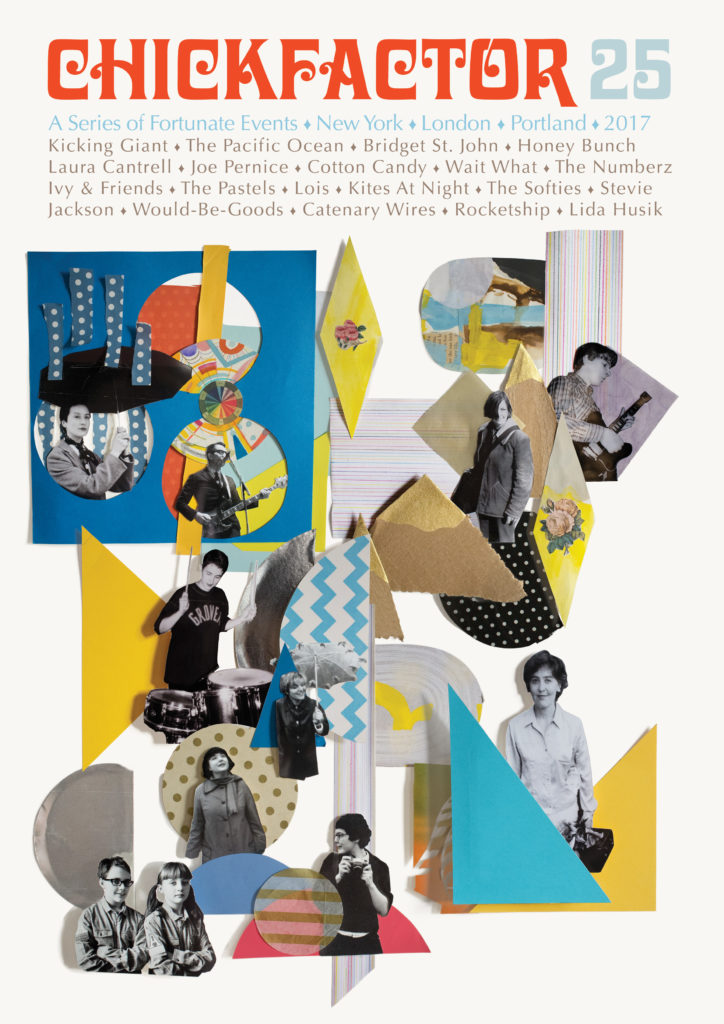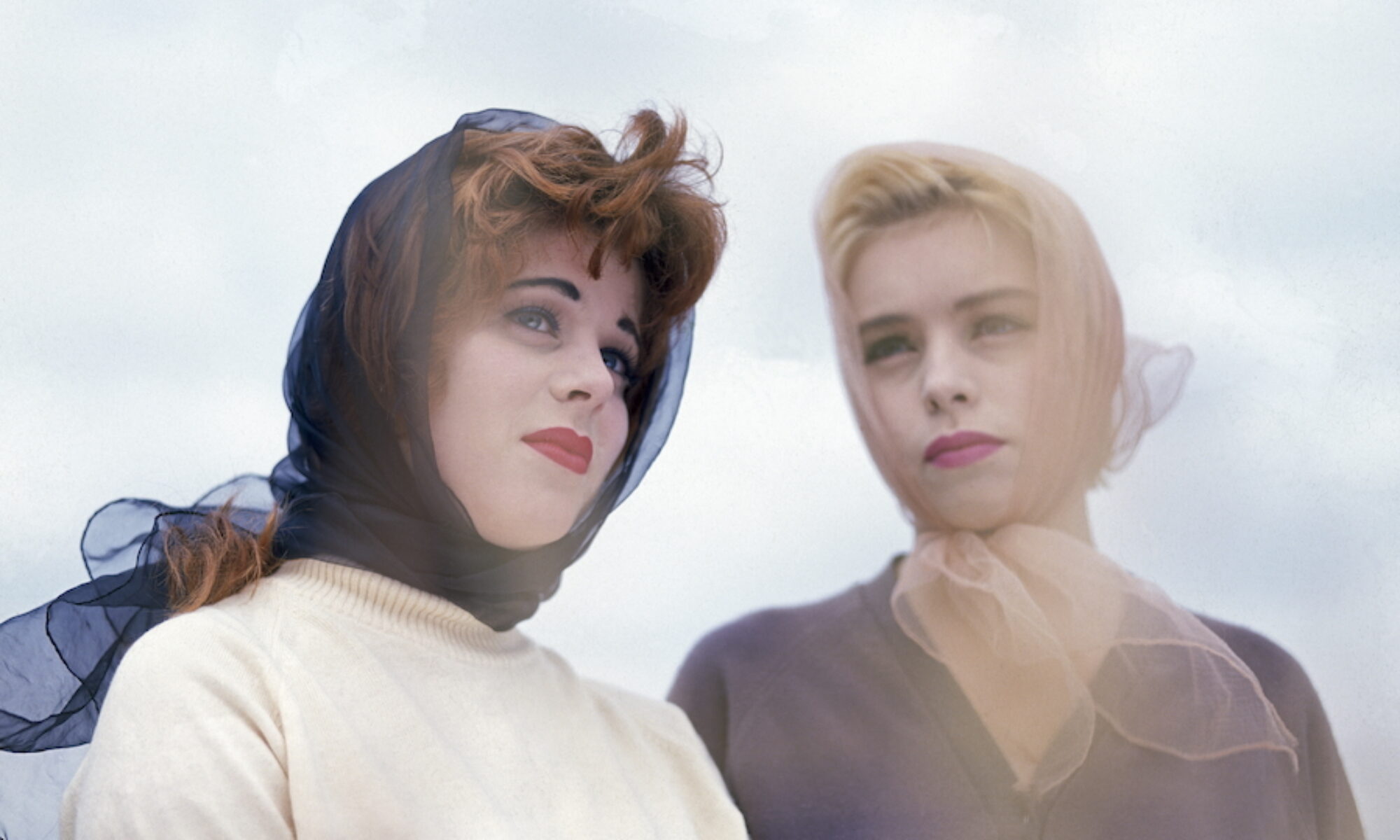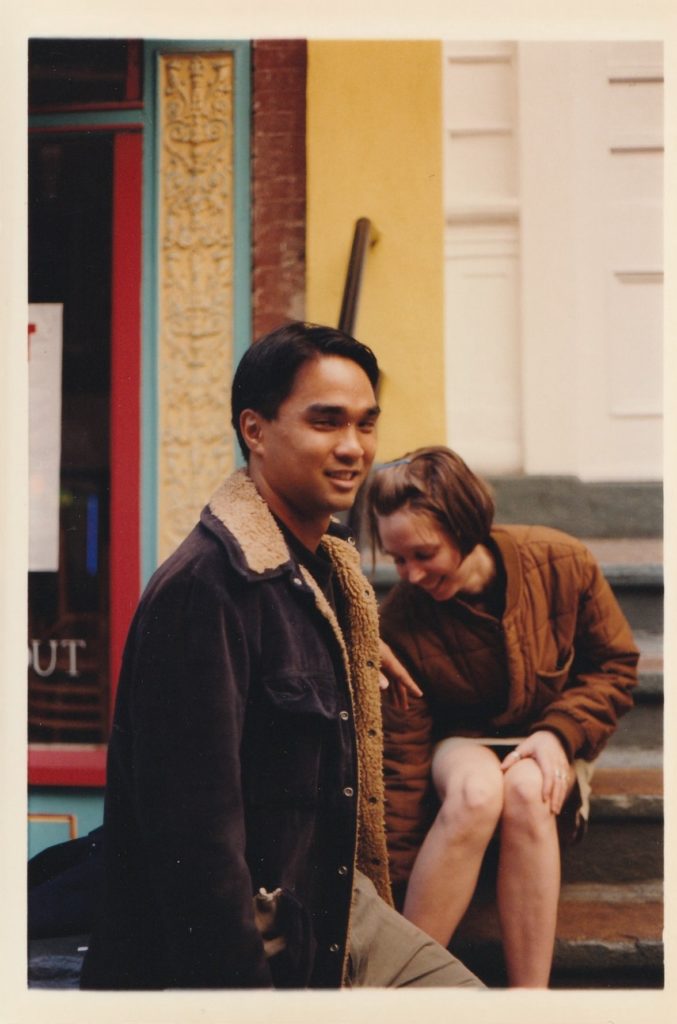
The Pacific Ocean was a band that formed around 1996 and made music through the early 21st century, releasing one EP and two albums that remain criminally neglected and underrated. The brains, brawn and beauty (and heart and soul) of the band were Edward Baluyut (Versus) and Connie Lovatt (Containe, Alkaline), with Steve Pilgrim as a pretty regular member. As Enchanté and Teen-Beat both premiere their music on Bandcamp this Friday, we rounded up some friends, family and fans of the band to try to remember what was so great about them!
Why did you decide to form the Pacific Ocean?
Connie Lovatt (The Pacific Ocean): Have you seen Ed play guitar or drums? He’s very thought out and precise. But he’s also really responsive and open. He’s also very supportive and patient. And I required patience. I didn’t know anything about playing instruments compared to him. We were friends for a while before we started playing together so I just remember it being really easy.
How did you meet?
Connie Lovatt: All things that involve me playing music start with Richard Baluyut. He introduced me to the songs of a million bands. I met Ed and Fontaine through Richard. I met Richard when I was a baby19. My first interaction with Ed was when he was on the phone with Richard, and I remembered he said something really crass about me and I liked him instantly. Or wanted him to like me.
What was the biggest inspiration for the songs you wrote?
Connie Lovatt: Love that righted me and love that wronged me.
How did you write and record songs?
Connie Lovatt: Ed wrote ideas on guitar. If I could manage worthwhile vocals and bass, then we had enough to structure things. Ed was the captain.
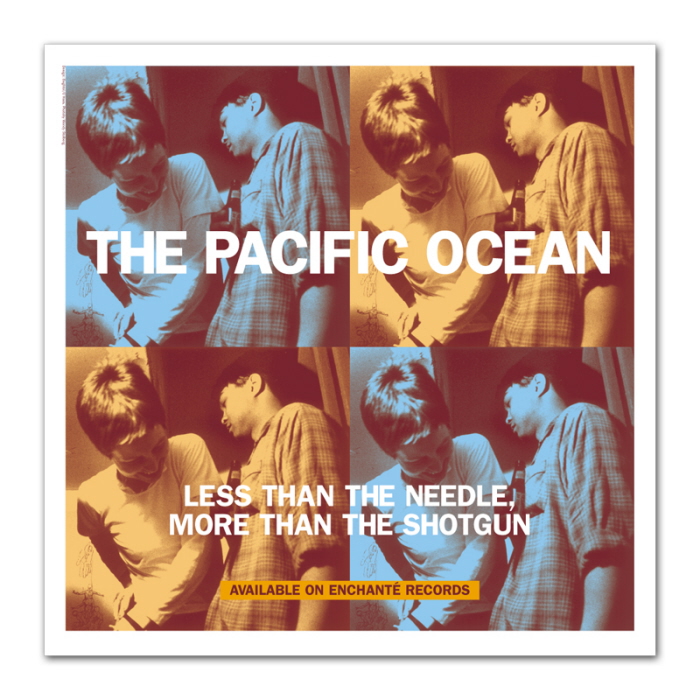
What was Ed like as a child? Were you guys all musical?
James Baluyut (Versus, +/-): Ed was an overachiever as a kid. Super competitive with his older brother. Reading Tolkien in 4th grade. Advanced math. Honors student. He was even a football star in middle school. He had a considerable size advantage in eighth grade. He was the same height in eighth grade as he is now! Unfortunately, everyone else grew the following year and his future football career evaporated. Both Ed and Richard played organ from a young age and then stopped. My parents didn’t really push me into that though I kinda wish they had. We listened to classic rock radio a lot in the car. Detroit’s a good place for that. For some reason, our parents let us kids control the radio. Our older cousin had a guitar and a Marshall. He took us to see Pink Floyd Live at Pompeii. That’s probably where it all started. The Abbey Theater 1-2-3.
Richard Baluyut (Versus): Ed is the classic middle child, innately driven to try to be better than his older brother, and occasionally succeeding; he is a much better drummer and basketball player than I am. And at organ.
How long have you known the Baluyut Bros?
Patrick Ramos (Versus, +/-{Plus Minus}: I have very few memories in my life of a time before I knew the Baluyut Bros. They aren’t in all of those memories but the ones in which they are, are all traumatic. Kidding! We lived about a mile apart from each other and our parents were friends, so our families pretty much grew up together. True story: I lent them my drumset and Casio keyboard for some of their earliest musical ventures.
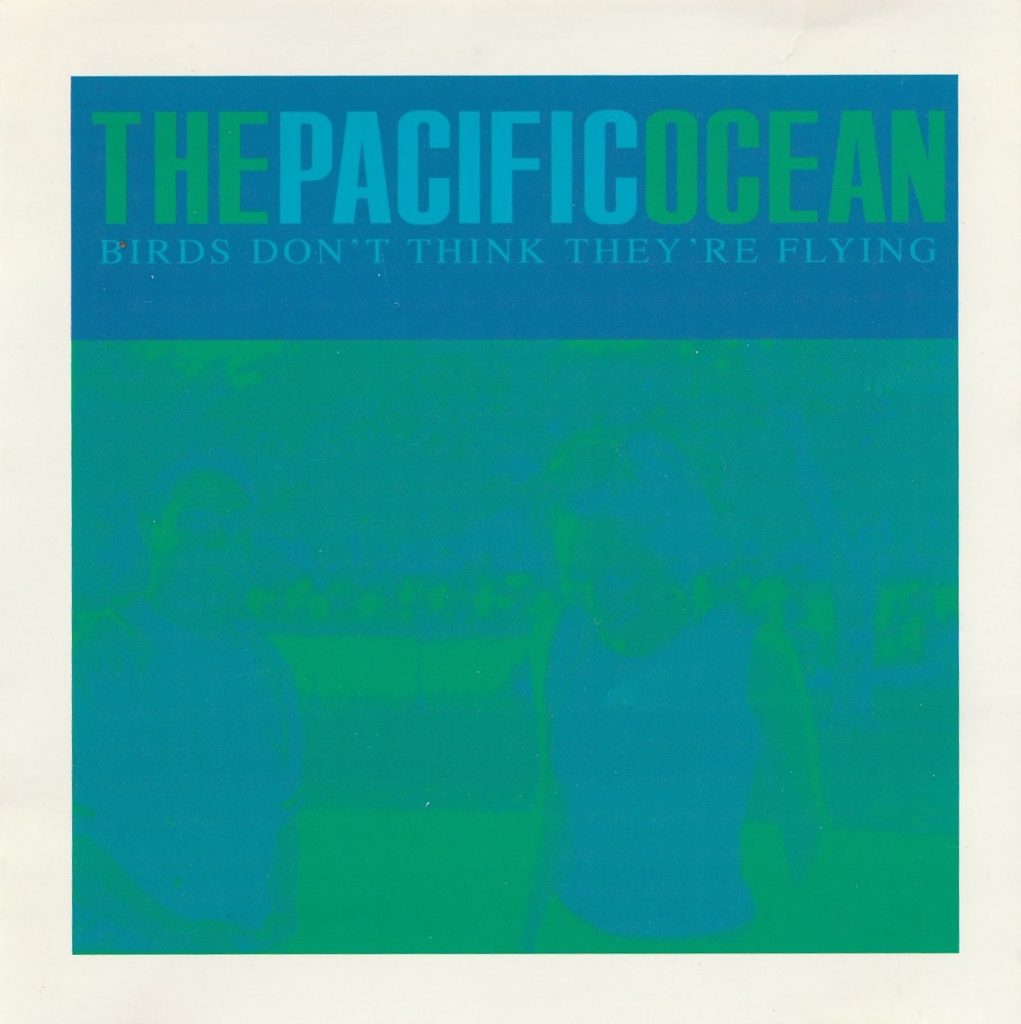
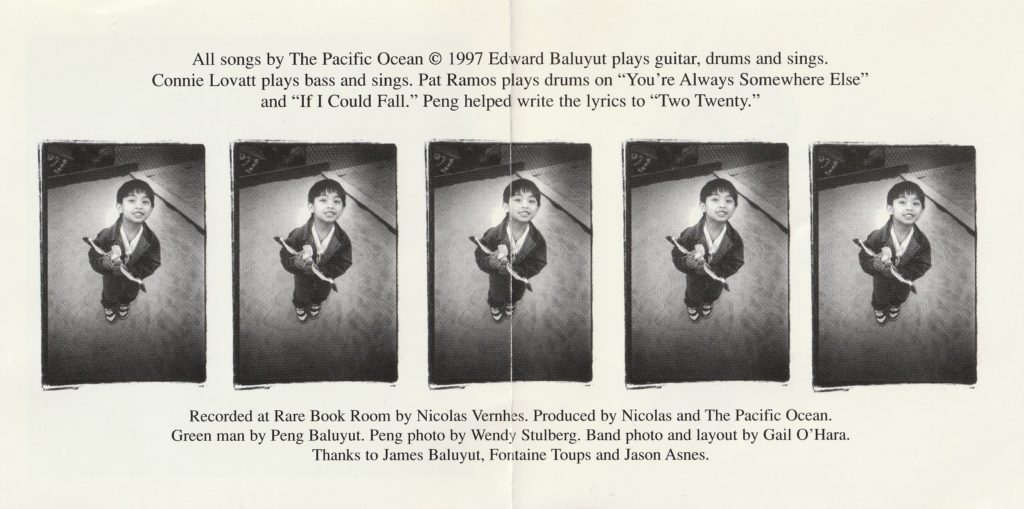
Tell us about the ideas that went into making the records:
Birds Don’t Think They’re Flying (Enchanté, 1997)
Edward Baluyut (The Pacific Ocean): We recorded the album spontaneously in basically 3 days. Nicholas Vernhes (Rare Book Room) was just starting to build his new studio and he recorded it and produced it for basically nothing as he was testing out his new equipment. Since he was doing us a favor, we did our takes very quickly without worrying about correcting small mistakes. Also, I had to come up with drum parts on the spot since we didn’t have a drummer yet. The result was a relatively raw-sounding record, but we were definitely proud of our first EP, and for me, it felt good to be a primary songwriter for the first time since, with Versus—as much as I enjoyed finding my “voice” as a drummer—I was playing more of a supporting role.
Connie Lovatt: This was our first time recording. It went quickly. Nicolas was trying out his new space and stuff. I was so happy to be getting the songs down and playing with Ed. I remember it being loose and easy. And the way Ed took my sense of melody seriously was a game changer for me. He was vocal about it in a way that still gives me a spine. We were with Nicolas. So it was comfortable.
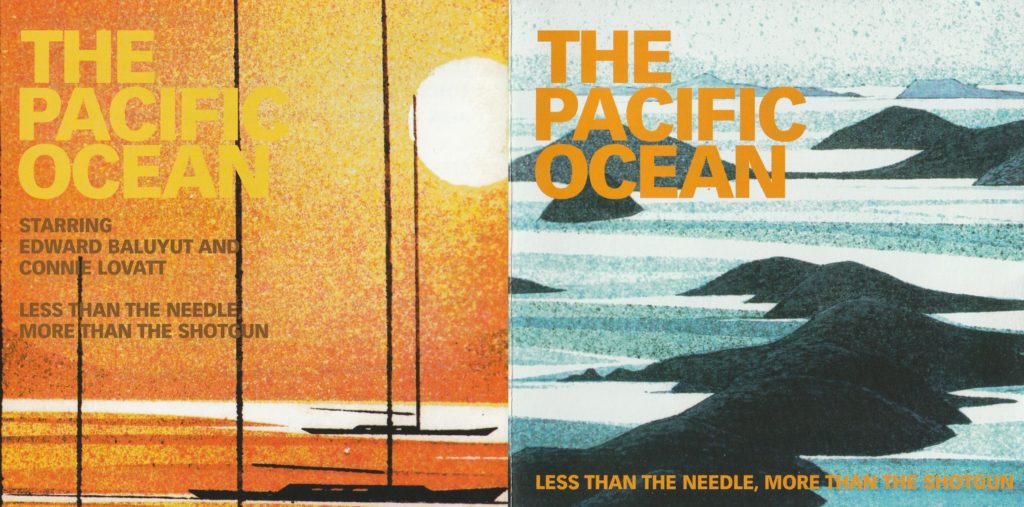
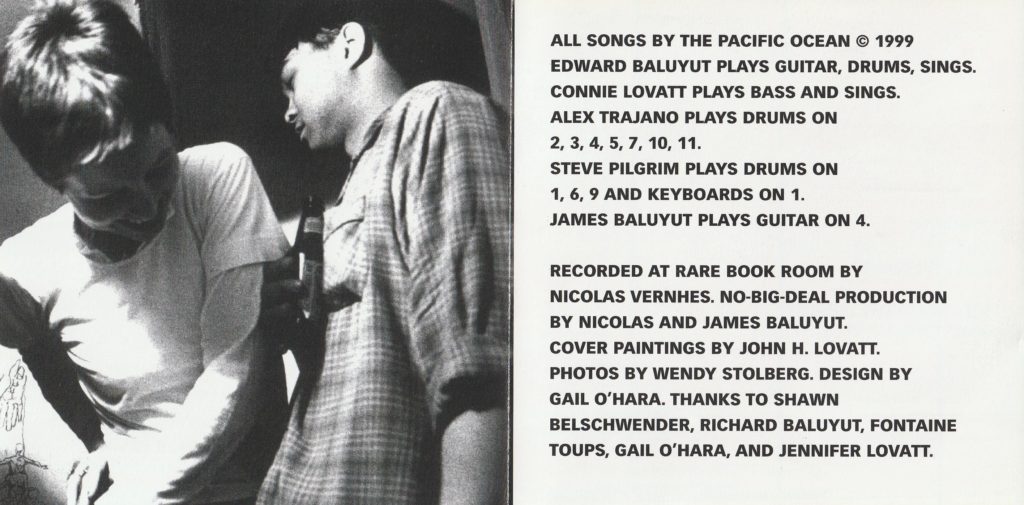
Less Than the Needle, More Than the Shotgun (Enchanté, 1999)
Edward Baluyut: We spent more time on this album, which had a more polished feel. We had Alex Trajano, a real musician who went to music school, on drums, and we had James Baluyut come in to produce it. We sat on the recording for a while and then wrote three new ones a few months later with Steve Pilgrim on drums. These ended up being my favorite songs on the record: “Nothing Is Too Kind,” “Fantastic Trip” and “All the Better Luck.”
Connie Lovatt: We had more time and knowhow with this one. Things felt more cohesive yet spread out song wise in that we covered more ground. Ed is kind of a quiet workhorse. He just gets things done in a studio. The songs felt bigger this time. Jimmy was there! A lot of Thai food. And Steve Pilgrim was now in the band and he brings a barbed sweetness to things. He’s fun to record with. Again, we were with Nicolas and we all knew each other well enough by then so it was easy.
What were you like back then?
Connie Lovatt: According to Ed and Steve I was “a ball of emotion”. But adorable, obviously.
Did you play with the Pacific Ocean? When?
Patrick Ramos: The degree of my memory loss hadn’t really occurred to me until now but it came back to me that I played on TPO’s first album. I’m the drummer on “If I Could Fall” and “You’re Always Somewhere Else,” which is simultaneously thrilling to remember and depressing to have forgotten.
Alan Licht: I don’t remember how it happened that they asked me to play on [So Beautiful and Cheap and Warm] but I really liked the songs, and it was nice to be in the studio with Bill Callahan, who I already had known for a while. We played a few shows around New York which were sort of low key but fun. Then we did a tour with Smog (can’t remember if it was still Smog or Bill was going under his real name yet) in the South, New Orleans, Texas. I remember being sort of stuck in New Orleans because Bill’s tour manager had misplaced a bunch of merch, or gear, and that was being sorted out. I also remember going to a hardcore show that was happening across the street when we were playing in Houston, because it was the same promoter for both shows, and that was intense—the audience was standing a mile away from the stage at our show, and they were swarming the band at the hardcore show. We wound up staying at someone’s house there, and I offhandedly said I’d like to see Rothko Chapel while I was town and they said, “It’s across the street from us”—it was true, the next morning I woke, crossed the street, and it was right there. It was a different drummer on that tour than Steve Pilgrim, who played on the record—Chris Deaner, who was amazing and I think went on to play with Kelly Clarkson.
Steve Pilgrim (The Pacific Ocean): It would have been 1997. I was looking for a band to play with, and actually Joey Sweeney said Ed had left Versus and they needed a drummer. So I looked Richard up in the literal phone book and cold called him. If I hadn’t known Joey, he probably would have hung up, but I ended up practicing a couple times with them to feel it out. They ended up going with Patrick as we know, but Richard said Ed had a good band and I should play with them. I met Connie and Ed at an Unsane show at Coney Island High, we got along, and the rest is world famous history. Actually the first TPO song I heard was when they played me the cassette of the Birds EP in Ed’s van. About 60 seconds into “Duet”, I was in. I’m a sucker for the trademark Baluyut majestic rock sound.
Richard Baluyut: I’ve played with TPO a few times, once playing the aforementioned organ, and then a few years ago filling in on bass so Connie could fully wield her star power.
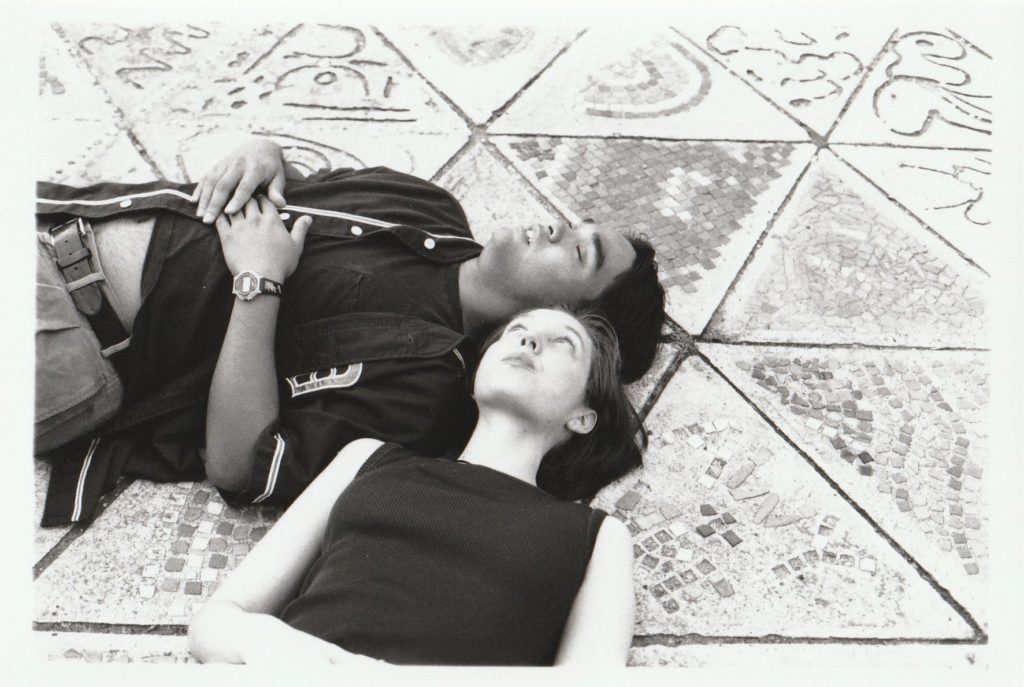
Do you remember the recording process of Less Than the Needle?
Steve Pilgrim: I wish I could! It was mostly recorded by the time I joined. But we came up with some good new songs in practice, so we went in with Nicolas Vernhes to add “Nothing Is Too Kind”, “Fantastic Trip”, and “All the Better Luck,” which only took a day or two I think.
Were you involved in the songwriting process at all?
Steve Pilgrim: Only to the extent that songs were written in practice. Generally Ed and Connie would bring ideas, parts, fragments of songs, and we would play around with them until they turned into something. Sometimes they’d have a song almost fully written, but generally we felt our way there by playing. Coming up with drum parts to their ideas could be difficult, and there was a lot of soul searching in the practice room. Sometimes practice felt more like therapy, and I may have quit once or twice, but things always seemed to come together sooner or later.
You coproduced Less Than the Needle, More Than the Shotgun with Nicolas. What was that process like?
James Baluyut: Connie and Ed always liked to joke about my “no big deal” production. I’m about as far as you can get from an iron-fisted tyrant in the studio. I was there mainly to provide another perspective. The band knew what they wanted for the most part, and it was up to Nicolas and me to help them get it all on tape. I helped mainly with guitars and guitar sounds, and I tossed in a few production ideas. I played a little guitar, but I was treading lightly as I didn’t want to get in the way of what was already special.
What do you remember about making Less Than the Needle?
James Baluyut: Not much to be honest! I do remember sitting in the control room at Rare Book Room a lot. I sat with Nicolas while the band knocked the takes out in the live room. I remember it mostly being easy… and easy-going. It was a joy to hear the songs as they were being recorded. Also, I loved watching Alex Trajano and Steve Pilgrim drum.
What was it like working with the Pacific Ocean?
Bill Callahan (producer, So Beautiful and Cheap and Warm): I was blown away by the distinct musicality of the group. The way Ed and Connie’s voices worked together to make an organic third voice. The way they played their instruments—the parts they came up with were unique to them. I asked them to do things and they usually knew what I meant and did them very well. I was never really sure how much the entire band wanted me there because they were accustomed to me not being there.
What did the Pacific Ocean sound like?
Heather Larimer (Corvair, Eux Autres): Connie’s voice has an intimacy and purity that reminds me of the ethereal singers of the ’70s but also a frankness that makes you feel like she’s telling you and only you something very directly. TPO feels like sitting in a San Francisco Inner Sunset apartment on a day that’s a duel between fog and sun and you’re making coffee and slightly high and wondering why you feel feelings so intensely and what that means for your ability to shape any sort of coherent future for yourself.
John Lindaman (True Love Always): Apart from basic genre descriptions and the level of quality of the work, both Containe and TPO had a similar uniqueness to them, which came from a successful combining of two distinct strong musical personalities. It’s pretty unusual for bands to be able to do that instead of “one of X’s songs, one of Y’s songs” or “Neil writes the lyrics but Geddy sings.” And maybe that’s how it actually was and it just didn’t come across that way—either way it worked!
Richard Baluyut: People were surprised at Ed’s guitar playing, but I wasn’t. Way before Versus, he always brought a unique tonality to the table in Flower. And Connie at that time was kinda just finding her voice, still had “beginner’s mind,” a state we all strive to get back to, and really expressive. So the two together just sounded different, and great. They had a song that was called something else originally, but became “Five”; that was my favorite. Also the one that gets loud, “I’m Part of Everything Again.”
James Baluyut: A moody collision of intellect, poetry and emotion with pop sensibility.“Fantastic Trip” is my favorite. Just so perfect and weird and catchy. I can’t imagine any other band coming up with that song.
Patrick Ramos: I have a distinct memory of listening to an early copy of The Pacific Ocean’s Birds Don’t Think They’re Flying for the first time in the tour-van after an in-store show at Stinkweeds in Phoenix. Hearing “Duet,” then “Letter/Doctor,” then “Two Twenty,” and “Last Minute” was like a series of gorgeous punches to the heart.
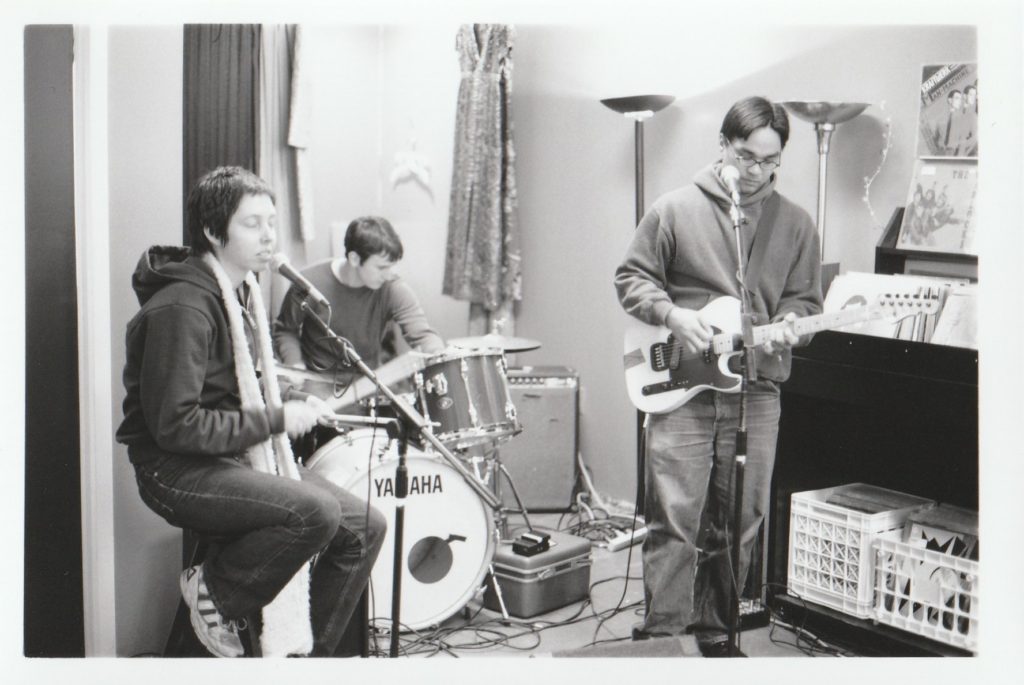
Do you remember any live shows?
John Lindaman: I remember the TLA/TPO/Versus show we played in 1998 at The Point in Atlanta—TLA at that point were mostly vegetarian, and the Versus crew was naturally going to all the finest BBQ places, which meant we tagged along but denied ourselves the good food in front of us. We said, “Well, we’ll just eat at the club,” and when we got there the club was like “and the vegetarian’s delight—two bowls of freshly popped popcorn.” But the shows were great of course!
Bob Bannister (Fire in the Kitchen): I am sure I saw both bands live multiple times. I did appear as a guest guitarist at a show in the early 2000s, pretty sure it was at The Fez.
Gail O’Hara (Enchanté Records, chickfactor): I have fond memories of the Pacific Ocean at Tonic, just because I shot video and it blows me away to watch it now. Also the reunion they did at Union Pool in 2017, when they felt way too huge for the stage and room, and Connie had evolved into this superhero frontperson I always knew she was, backed by the foxy Baluyut Brothers™. They’re the only men on earth who can rock a man-bun.
Steve Pilgrim: I remember the driving more than the shows, probably. We did a couple road trips, including a few shows on the west coast with the Magnetic Fields that we joked probably had the longest miles-traveled-to-shows ratio in history. Coming from New York, we played a show in Chicago, and then the next one was LA, and we went up the coast from there. But the trip, especially traversing the southwest, became its own whole experience. The three of us had a definite dysfunctional family dynamic, with Ed, the rhetorical master of the gentle cut, possibly holding the thing together in his wry and steady way. We laughed a lot, yelled a bit (mostly me), but I don’t know if any of it amounted to very tellable stories. I can say Connie would almost certainly never have heard Rush’s “By-Tor and the Snow Dog” without me on that trip, but I’m not sure if that’s a good or a bad memory.
What are some of your fondest memories of shows you played?
Connie Lovatt: The shows you really remember are the ones when something goes wrong. I won’t tell tales. Even on myself. The good memories become part of that thing that makes you want to be on stage with those people anytime.
Edward Baluyut: My favorite shows were always the Chickfactor shows at the Fez. They always had a cool cabaret feel to them, and you could always count on sharing the stage with other great musicians. Gail O’Hara really knew how to curate a show!
What was it about “Last Minute” that made you want to cover it?
James McNew: I loved that song from the first time I heard it. It’s effortlessly perfect and cryptic. I felt like I had to sing it, too.
What made you want to release the Pacific Ocean’s music?
Mark Robinson (Teen-Beat Records): Mostly because the album they had recorded was (and still is) pretty incredible.
Gail O’Hara: It just evolved out of Containe, made sense. We are family. And they’re great.
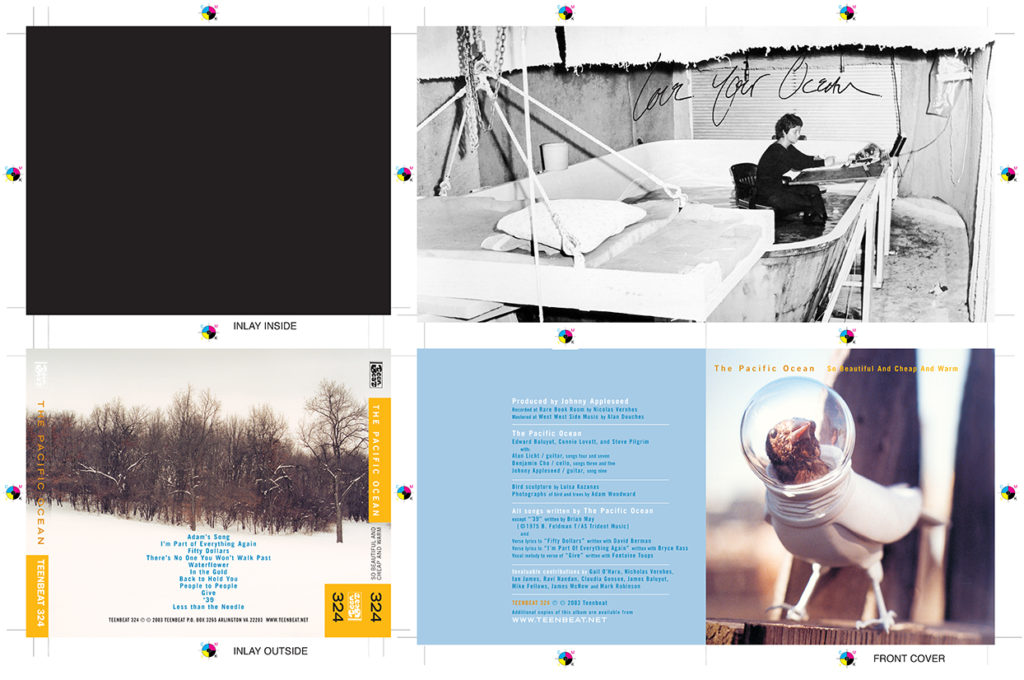
The Pacific Ocean was often described (dismissed?) as a Versus side project. Did it seem like their records got enough attention at the time?
Bill Callahan: I was surprised the record I helped with didn’t blow up.
Alan Licht: It was always an underrated band—they had great songs. I wish it had lasted a bit longer. I don’t really think of other bands in relation to them. I think Steve Pilgrim called it “baroque folk pop” or something like that, which is sort of funny. Connie was close to David Berman so maybe there’s a little bit of a parallel in terms of an interest in poetry and how to apply that to writing songs; and I think at least one song on the Teen-Beat record is co-written with David.
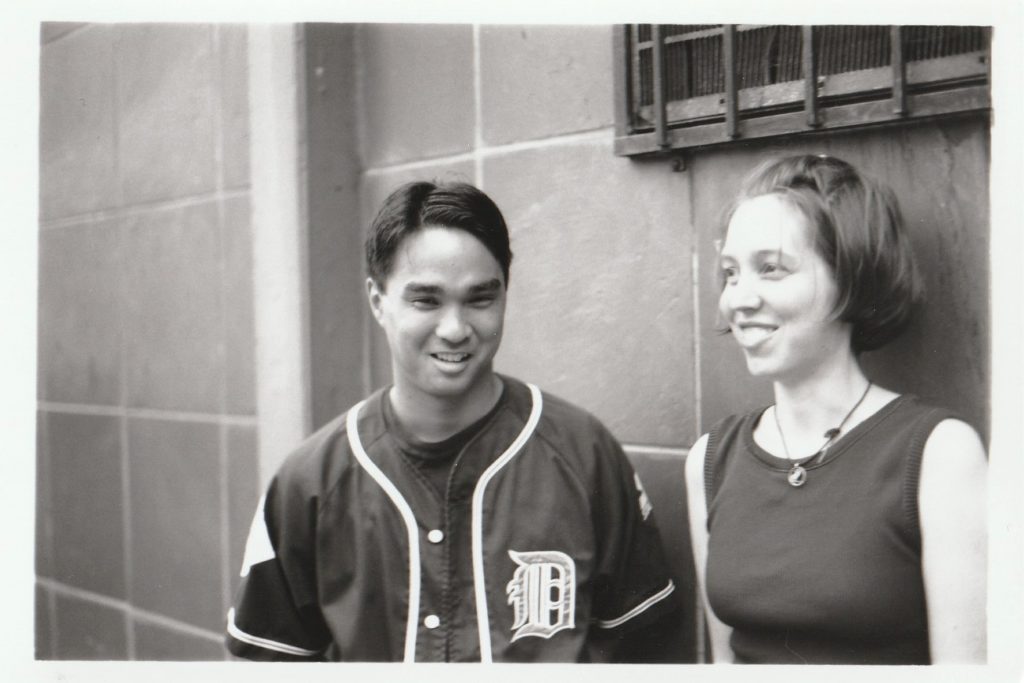
What was it like being in the Pacific Ocean as opposed to your other bands?
Connie Lovatt: Well, there’s that famous Baluyut humor. Which involves psychological pointing and taunting. And Steve notices everything and is in no shortage of looks or comments. And I was a ball of emotion apparently. And both Ed and Steve are ceaselessly generous and kind. So it was great.
How do those records sound to you now?
Bill Callahan: I still have a lot of the songs in my head!
Steve Pilgrim: They sound great—definitely of that late ’90s, early ’00s time and sound, but I believe they’ve weathered the years really well as a good example of that particular sound. Of course it’s nostalgic, listening to them, but Ed and Connie’s writing is just so good that those songs will always hold up. And I still don’t know what half the lyrics are, so that gives me a reason to go back and keep listening.
Tell us any other stories you remember about Connie and the Pacific Ocean.
James Baluyut: I initially heard the first TPO EP while on tour with Versus. I remember we were all like, “Damn, that’s good.”
Bill Callahan: We had an afterparty on the last day of recording. Connie had two sips of vodka. I’d never seen her drink before and was worried after the second sip, which she drank as if it had a baby snake in it. We ended up having to pull over so she could hurl in the street. CF
